In a 2018 BCG global study, among the Top 5 work preferences were “good relationship with superior”, “learning opportunities”, and “career development”, all of which are closely associated with their direct boss acting as coach or mentor.
When managers are practicing a coaching approach at work, some of them tend to overuse it with good purpose, and opt for coaching when they should definitely be doing something else. If that happens too often, their people can get very frustrated and lose trust in coaching altogether. Here are five situations when coaching is not the answer:
When you want to give someone feedback
If you don’t like something you see or experience from a member of your team, you shouldn’t be coaching that out of them with questions. It is your responsibility to articulate your supportive feedback by describing the problem, giving specific examples, and focusing on the issue, not the person. Coaching, however, can be taken out of your toolbox when the solution is designed and action steps are agreed later in the discussion.
When they need input from your experience and/or knowledge
Coaching comes handy when a manager is approached by his or her team members with a problem. In order for your colleagues to develop, it’s ideal that they do the thinking themselves and find their own answers with you helping by listening attentively and guiding the conversation with good questions. However, if the individual doesn’t have the necessary knowledge or experience, this approach will not yield a satisfactory result. In this case, it is much more appropriate for the manager to share relevant experience from the past and/or teach specific bits of knowledge needed to solve the problem.
If you are the one who has to make the decision
There are few things more frustrating for an employee than answering theoretical questions about a situation where he or she does not have decision making authority. It is fully okay for the manager to ask clarifying questions to get a good understanding of the issue at hand, but then it is his turn to make up his mind and give direction for further action.
If your involvement is necessary to escalate something or settle an issue with a peer manager
When listening to your colleague’s problem, it might become evident that your direct involvement will be unavoidable. Certain issues require the weight of your role or stronger presence to sort it out in the management team, and sometimes it may even be necessary to ask support from your superior. In any of these cases, you should turn up your sleeves and initiate action yourself.
When prompt answer/action is critical at the moment
The fifth situation when coaching is not the preferred solution is when there is urgency involved. Even though in a normal situation learning should take precedence, if there is a need to act quickly, it is wiser to make your recommendation on what to do. I deliberately chose the word “recommendation”, as it is very rarely needed to order people around. Yes, if it is really life-threatening emergency. Note: managers facing a lot of stress tend to feel rushed all the time, so make sure you don’t judge all situations urgent, where there is no time for coaching!
While coaching is a great tool that enhances learning, motivation, cooperation and interpersonal relationships, it is critical that you learn, ideally from your own experience, when to use it and when to take a different approach.
Act2Manage Application
An interactive, gamification-based, practice-oriented leadership development application that provides immediate help and enables follow-up to the most common dilemmas.






